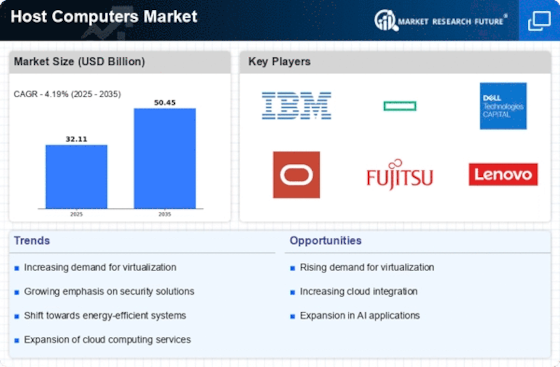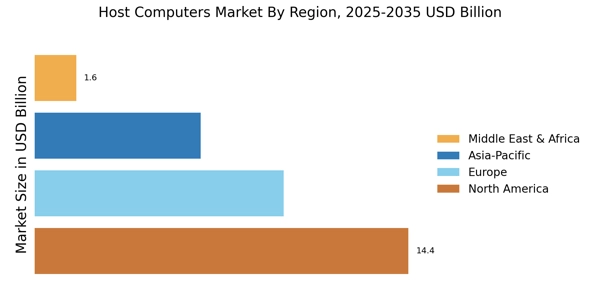Growing Cybersecurity Concerns
In the Host Computers Market, the rising concerns regarding cybersecurity are shaping purchasing decisions. As cyber threats become more sophisticated, organizations are investing in host computers that offer enhanced security features. This includes hardware-based security measures and advanced encryption capabilities. The cybersecurity market is projected to reach substantial figures, with estimates indicating a growth rate of approximately 15% per year. This trend suggests that businesses are increasingly aware of the need to protect sensitive data, thereby influencing their choice of host computers that can provide robust security solutions.
Increased Demand for Data Processing
The Host Computers Market is experiencing a surge in demand for robust data processing capabilities. As organizations generate vast amounts of data, the need for efficient processing solutions becomes paramount. This trend is driven by sectors such as finance, healthcare, and telecommunications, which require high-performance computing to analyze and manage data effectively. According to recent statistics, the data processing segment is projected to grow at a compound annual growth rate of over 10% in the coming years. This growth indicates a strong reliance on host computers to handle complex computations and large datasets, thereby enhancing operational efficiency and decision-making processes.
Emergence of High-Performance Computing
The Host Computers Market is witnessing a notable emergence of high-performance computing (HPC) solutions. Industries such as scientific research, engineering, and artificial intelligence are driving the demand for HPC systems that can perform complex calculations at unprecedented speeds. The HPC market is anticipated to grow significantly, with projections indicating a compound annual growth rate of around 9% over the next few years. This growth reflects the increasing reliance on host computers to facilitate advanced simulations, modeling, and data analysis, thereby enabling organizations to innovate and remain competitive in their respective fields.
Integration of Internet of Things (IoT)
The Host Computers Market is being transformed by the integration of Internet of Things (IoT) technologies. As more devices become interconnected, the need for host computers that can manage and process data from these devices is becoming critical. The IoT market is expected to expand rapidly, with forecasts suggesting a growth rate of over 20% annually. This trend indicates that organizations are seeking host computers capable of handling the influx of data generated by IoT devices, thereby enhancing operational efficiency and enabling real-time decision-making. The convergence of IoT and host computing is likely to redefine industry standards and operational paradigms.
Advancements in Virtualization Technologies
The Host Computers Market is significantly influenced by advancements in virtualization technologies. These innovations allow multiple virtual machines to run on a single physical host, optimizing resource utilization and reducing costs. Organizations are increasingly adopting virtualization to enhance flexibility and scalability in their IT infrastructure. The market for virtualization software is expected to expand, with estimates suggesting a growth rate of around 12% annually. This trend indicates that businesses are prioritizing efficient resource management, which in turn drives the demand for host computers capable of supporting advanced virtualization solutions.


















Leave a Comment